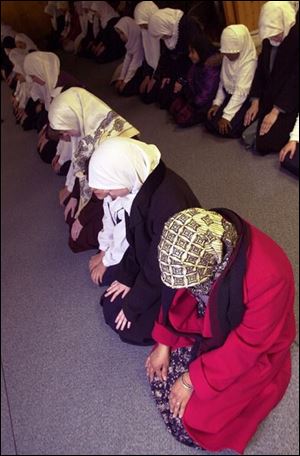
Ramadan's strict fast has a festive side
11/25/2000
Before starting a discussion of Ramadan, students and faculty pray at the Toledo Islamic Academy school.
The practice of fasting for religious reasons is often shrouded in somberness and solemnity, but not for Muslims, who begin the month of fasting known as Ramadan next week.
Although Muslims young and old will maintain a strict fast from food, drink, and other pleasures from dawn to sunset each day beginning Monday or Tuesday (depending on the sighting of the new moon), they will break the fast each night in cheery social gatherings. Despite their daylight deprivations, their evenings will be bathed in a warm communal glow as families and communities assemble for a meal after the nightly Taraweeh prayers, which are held during Ramadan.
“To me, Ramadan is when I get together with my community,” said Rabia Khan of Sylvania, the 16-year-old student government president at the Toledo Islamic Academy.
During Ramadan, Miss Khan not only sees her fellow students at the academy in class during the day, but she also is with them at night when families come to the Masjid Saad next to the school for Taraweeh prayers and the iftar, the communal meal that breaks the fast.
For Miss Khan and the 145 students at the academy, Ramadan is clearly something to be anticipated with eagerness rather than dreaded because of its demands.
Ahmed Zoabi, 7, of Sylvania, a student at the academy, fasted for the first time last year for the entire month and added three more days at the end. “Just because I wanted to,” he said. Ahmed said he considers the Ramadan fast to be “easy.”
Adult Muslims who may not find it so effortless prepare for the demands of the fast by abstaining from food and drink for partial days or two days a week in the weeks leading up to Ramadan.
Mustafa Albar, principal of the Toledo Islamic Academy, said the fast does require some type of preparation. Some Muslims, he said, begin as many as three weeks before Ramadan, fasting on Mondays and Thursdays in the tradition of the Prophet Mohammad. They also may start reading the Qur'an, Islam's holy book, more frequently, and attend worship services more often.
In addition, Mr. Albar said, it is important to begin working on bad habits like profanity or bad language before Ramadan starts. “This is crucial because when you are fasting, if you do these things, it could partly nullify the fasting and diminish the blessing and reward.”
Muslims can begin fasting at any age, Mr. Albar said, although they are generally expected to take part fully by puberty. Children at the academy decide to join in the practice without pressure from their parents, Mr. Albar said. Some start by fasting for part of the day, skipping breakfast and eating lunch, or fast all day and break the fast when they arrive home from school.
In the last few weeks, the Toledo Islamic Academy has been preparing students for Ramadan with short daily teachings about the holiday.
“How many more days to Ramadan?” Maher Sabra, the Islamic studies teacher, asked students at a school assembly on Monday. “Seven!” they responded with obvious enthusiasm.
“Ramadan is a great opportunity for all of us to be close to Allah and to be thinking about other people in need,” Mr. Sabra said. When he questioned the students about ways to prepare for Ramadan, the answers he received - all correct ones - included, “Watching less TV,” “Reading more of the Qur'an,” “Putting more money in the donation box,” “Start training yourself not to eat,” and “Come to Masjid more to get closer to Allah.”
Besides taking part in the fast and the nightly prayers and gatherings, students will have their own activities at school in observance of Ramadan.
Miss Khan is working on a program that includes the food and clothing drive, decorating the school in streamers and lights, a door-decorating contest, a Qur'an recitation contest, a cultural iftar, and skits, speeches, and presentations about Ramadan.
“Ramadan is during Christmas this year, and we don't observe Christmas so we wanted to do a lot of activities to make the kids be in the spirit of our holidays.”
Miss Khan, who has been fully fasting for Ramadan since she was in the fifth grade, said she especially loves decorating her school. “I like it when everything is decorated. It makes everything seem happy. You're thinking about your month and it makes you feel special.”
At the Masjid Saad, 4346 Secor Rd., Taraweeh prayers will be at sunset each night, followed by iftar.
Muslims at the Islamic Center of Greater Toledo, 25877 Scheider Rd., Perrysburg, will hold Taraweeh prayers at 8 nightly beginning on Monday, with iftar on Saturday nights only.
Ramadan will end on or about Dec. 28 with the Eid ul-Fitr, a major Muslim holiday known as the “feast of fast-breaking.”